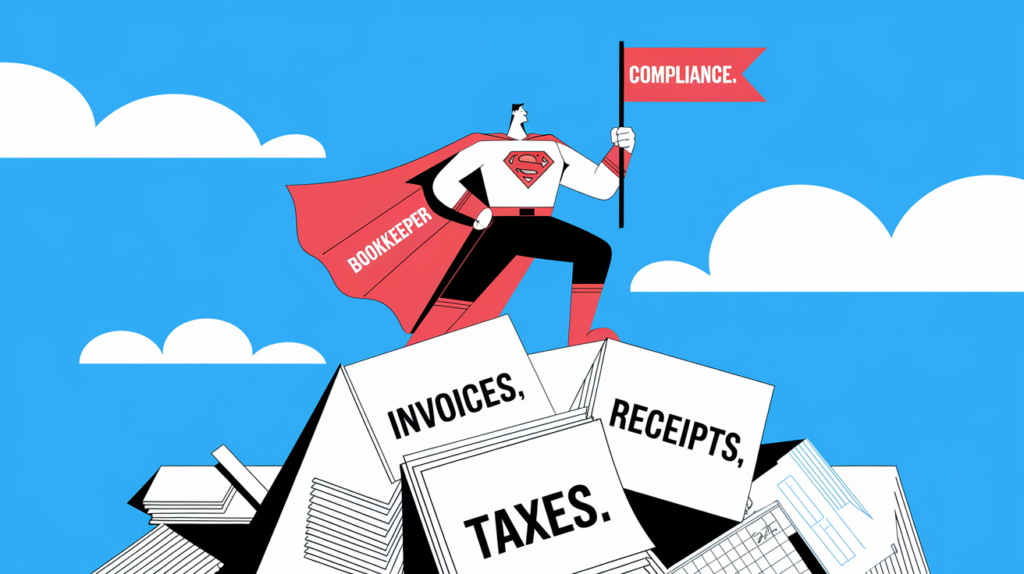Running a business can be exhilarating, but managing the financial side can quickly become a burden. Feeling overwhelmed by invoices, struggling to meet tax deadlines, or simply unsure about your financial health? These are all signs you might need a professional bookkeeper. This article explores the benefits of hiring a bookkeeping service, what to watch out for, and how to determine if it’s the right move for your business.
What Does a Bookkeeper Do?
A bookkeeper is a financial expert who handles the day-to-day management of your business’s financial records. Their key responsibilities include:
- Accurate Record-Keeping: Thoroughly recording all financial transactions, including sales, purchases, expenses, and payroll, using industry-standard accounting software and practices like QuickBooks Online or Xero.
- Compliance with Regulations: Ensuring your business adheres to federal and state tax laws, such as Generally Accepted Accounting Principles (GAAP), Sarbanes-Oxley (SOX) for publicly traded companies, and specific tax requirements for your industry, to avoid penalties and legal issues.
- Financial Reporting: Generating essential financial reports like balance sheets, income statements, and cash flow statements, providing a clear picture of your business’s financial performance.
- Accounts Payable and Receivable: Managing invoices, processing payments to vendors, and tracking outstanding customer payments to maintain a healthy cash flow.
- Bank Reconciliation: Regularly reconciling bank statements with your business records to identify discrepancies and ensure accuracy.
- Tax Preparation Support: Organizing and categorizing financial data to facilitate a smooth tax filing process and maximize deductions.
Why Hire a Bookkeeping Service?
Pros:
- Expertise and Accuracy: Bookkeepers are trained professionals who ensure your financial records are accurate, organized, and compliant with relevant regulations. For example, a study by the American Institute of CPAs (AICPA) found that businesses using professional bookkeeping services were 70% less likely to face IRS audits.
- Objective Financial Insights: An external bookkeeper offers unbiased perspectives on your financial health, identifying areas for improvement and potential cost savings. They can analyze your spending patterns, identify areas of inefficiency, and suggest strategies for optimizing cash flow.
- Time Savings: Outsourcing bookkeeping frees up your time to focus on core business activities like strategy, sales, and customer relationships. Imagine reclaiming hours each week spent on tedious data entry and paperwork!
- Reduced Stress: Say goodbye to the stress of managing finances and worrying about compliance, allowing you to concentrate on growing your business. No more late nights trying to balance the books or decipher complex tax codes.
- Improved Decision-Making: Access to accurate and up-to-date financial data empowers you to make informed business decisions based on real-time insights. Need to secure a loan or make a major investment? Solid financial records are essential.
Cons:
- Cost: Bookkeeping services come with a price tag. However, consider it an investment that can save you money in the long run by preventing costly errors and maximizing tax benefits. Typical costs can range from $500 to $5,000 per month, depending on the volume of transactions, complexity of your needs, and service level.
- Security Risks: Sharing sensitive financial information requires trust. Mitigate risks by choosing a reputable service with strong security measures, such as data encryption, secure servers, professional certifications like Certified Public Bookkeeper (CPB), and background checks for their employees. Look for providers who adhere to industry best practices like the AICPA’s Statement on Standards for Attestation Engagements No. 16 (SSAE 16).
- Potential for Hidden Fees: Clarify all potential costs upfront to avoid surprises. Ask about their fee structure and any additional charges for specific services like payroll processing or year-end reporting. A clear service level agreement (SLA) will outline all services and associated costs.
Getting Ready to Outsource Your Bookkeeping
Before you hire a bookkeeper, take these steps to ensure a smooth transition:
- Organize Your Existing Records: Gather all your financial documents, including bank statements, invoices, receipts, and expense reports.
- Choose Accounting Software: If you don’t already use accounting software, select one that suits your business needs. Popular options include QuickBooks Online, Xero, and FreshBooks.
- Establish Clear Goals: Determine your specific bookkeeping needs and expectations. Do you need help with day-to-day tasks, tax preparation, or financial reporting?
- Set a Budget: Determine how much you can afford to spend on bookkeeping services.
Is it Time to Hire a Bookkeeper?
Consider these scenarios:
- Overwhelmed and Time-Crunched: If bookkeeping tasks consume valuable time, hindering your ability to focus on core business functions, it’s time to seek professional help.
- Lack of Financial Expertise: Unsure about financial regulations, tax optimization, or cash flow management? A bookkeeper can provide the expertise you need.
- Missed Deadlines and Errors: Late payments, inaccurate records, or struggles with tax filing indicate a need for professional bookkeeping assistance.
- Desire for Growth: To scale your business effectively, you need accurate financial data and insights. A bookkeeper can provide the foundation for informed growth strategies.

Choosing the Right Bookkeeping Service: A Checklist
- Industry Experience: Do they have experience working with businesses similar to yours? For example, if you’re a restaurant owner, look for a bookkeeper with expertise in the hospitality industry.
- Proven Track Record: Ask for client testimonials or case studies. Online reviews can also offer valuable insights.
- Qualifications and Software Proficiency: Ensure the bookkeeper has the necessary certifications and is proficient in the accounting software you use.
- Clear Communication: Establish clear communication channels and expectations for reporting and access to your financial data. Will you have a dedicated account manager? How often will you receive reports?
- Data Security Measures: Inquire about their data security protocols, including encryption, secure servers, and employee background checks. A reputable provider will prioritize the confidentiality of your financial data.
- Transparent Pricing and Service Level Agreements: Obtain a clear service level agreement (SLA) outlining all services, costs, and response times. Avoid services with hidden fees or unclear contract terms.
Final Thoughts
A skilled bookkeeper is an invaluable asset to any business. By maintaining accurate records, ensuring compliance, and providing financial insights, they contribute significantly to your success. While there are costs and considerations, the benefits of outsourcing bookkeeping often outweigh the challenges, leading to increased efficiency, reduced stress, and improved financial health. If you’re ready to take your business to the next level, investing in a professional bookkeeping service is a wise decision.
FAQs
Q: How much does a bookkeeping service typically cost?
A: Bookkeeping service costs vary based on factors like the size of your business, the complexity of your transactions, and the services required. Some bookkeepers charge hourly rates, while others offer monthly packages. It’s essential to get a customized quote based on your specific needs. Typical ranges can be from $500 to $5,000 per month, but this can vary widely.
Q: What’s the difference between a bookkeeper and an accountant?
A: While both roles deal with financial data, bookkeepers focus on the daily recording of transactions, while accountants provide a broader range of financial services, including analysis, tax planning, and auditing. Often, they work together to provide a comprehensive financial management solution for your business.
Q: Can a bookkeeper help with my taxes?
A: Absolutely! Bookkeepers play a crucial role in tax preparation by organizing your financial data, ensuring accuracy, and maximizing deductions. They can also work closely with your tax preparer to streamline the tax filing process.
Ready to Simplify Your Finances?
Feeling overwhelmed by your business finances? XOA TAX can help! Our experienced bookkeepers provide accurate, reliable, and efficient bookkeeping services tailored to your business needs. We’ll handle the day-to-day financial management, ensuring compliance and providing valuable insights to drive your business growth.
Contact us today for a free consultation:
- Website: https://www.xoatax.com/
- Phone: +1 (714) 594-6986
- Email: [email protected]
- Contact Page: https://www.xoatax.com/contact-us/
Disclaimer: This post is for informational purposes only and does not provide legal, tax, or financial advice. Laws, regulations, and tax rates can change often. Please consult a professional advisor for advice specific to your situation.




 anywhere
anywhere  anytime
anytime